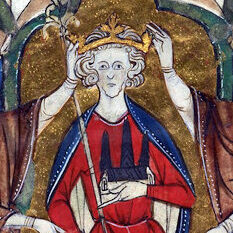1247

Isabella and Hugh were later embroiled in another plot against Louis, involving poison and cooks who talk a lot under torture. The former queen of England ended her days practically walled up in a nunnery. Hugh died a few years later, better remembered for his stint as a troubadour than his inglorious attempt to check the growing power of the French monarchy. Of their large brood of children, Henry invited four of them to come to England to enjoy the bounty of the north. They were a most disagreeable lot, full of boasting and swaggering with a sense of entitlement. Among those none too pleased with their overbearing reach were the Savoyards, the queen’s relatives who had at least tried to make an effort to assimilate. Things finally came to a head when Henry’s half-brother Aymer, appointed Bishop of Winchester despite being illiterate and ignorant, decided to encroach on the authority of the queen’s uncle Boniface, appointed Archbishop of Canterbury despite being soldierly and intemperate. The two sides had it out in a flurry of violence and excommunications until Henry stepped in and organized a truce one morning over a sumptuous breakfast. While the rest of the country found the antics of these bickering Frenchmen good entertainment, they were hardly amused by the drain on national resources required to sustain them. It was Simon’s own conflict with the scheming Lusignans that would eventually single him out as a leader of the opposition to Henry’s circle.

Henry had tried to make Uncle William of Savoy the Bishop of Winchester when he arrived ten years earlier, but the monks would have none of him. He subsequently left for Italy, where he was poisoned the following year in Viterbo. The monks were too afraid to say no to the king now, especially with Henry making an impassioned speech about his being born in Winchester, and that Aymer, though wholly ignorant of the language of the church, would nevertheless enlighten their lives like the sun. The monks gave in and Aymer proceeded to terrorize them, even locking them in on one occasion with no food for three days. The fortunate ones escaped and sought sanctuary in other churches.
Just as obnoxious as Aymer, but more dangerous to the affairs of England, was William de Valence. Henry signaled his favor for this youngest of his half-brothers by marrying him to a Marshal heiress and knighting him on the day when the king conveyed a relic of the holy blood to Westminster. The brothers further enriched themselves by exploiting the Jewish bond market. Henry’s constant demands for money forced Jewish creditors to sell their bonds cheaply, usually to well-placed members of the court like the Lusignans, who would then sue to get their hands on the land that was used as surety for the debt.
Boniface was no stranger to oppressing his diocese either. Armed guards accompanied him on his visitations, where he was likely to walk away with the parish kitty. He was forced to flee the country after one infamous visit came to blows and revealed that the temperamental primate was wearing chain mail instead of a hair shirt under his garments. He went back to France, where he helped his Savoyard bothers, one of them the archbishop of Lyon, try to free their eldest brother from imprisonment in Turin (the same Thomas who got his hands on Simon’s debt). This handsomest of the archbishops of Canterbury would spend half of his 30 years in office abroad.